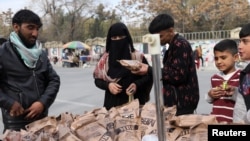The United States has berated the Taliban for what it said were misconstrued facts the Islamist group penned in a letter to the U.S. Congress this week regarding Afghanistan’s economic and humanitarian crisis.
The Taliban published the so-called open letter on Wednesday, calling on U.S. lawmakers to unfreeze about $9.5 billion in Afghan foreign assets and end financial sanctions placed on Kabul after the Taliban takeover of the country in mid-August.
The sanctions and disruption of international financial assistance have effectively collapsed the largely aid-dependent Afghan economy, wrote Taliban Foreign Minister Amir Khan Muttaqi. The new Taliban government has been unable to pay salaries to government employees and import essential goods.
Thomas West, the U.S. special representative for Afghanistan, said Friday in a tweeted statement that the South Asian nation was suffering a terrible humanitarian and economic crisis before the Taliban takeover, citing war, years of drought and the outbreak of COVID-19 pandemic.
West stressed that Washington had long made clear that critical nonhumanitarian foreign aid, including for basic services, would be ceased if the Taliban claimed power by military force rather than negotiating with the previous, U.S.-backed Afghan government.
“That is what occurred,” he said.
"Legitimacy & support must be earned by actions to address terrorism, establish an inclusive government, & respect the rights of minorities, women & girls -- including equal access to education & employment," West’s tweeted statement continued.
The envoy said the U.S. will continue to provide humanitarian aid to the Afghan people and has contributed $474 million this year. West added that efforts are also being made to help the United Nations and humanitarian actors to scale up to meet needs this winter.
“We will continue clear-eyed, candid diplomacy with the Taliban,” he vowed.
The U.S. administration has frozen the Afghan funds over human rights and terrorism concerns under the Taliban government, which is not recognized internationally. The Islamist group is also being asked to govern Afghanistan through an inclusive political system, where the rights of women and minorities are protected.
In his letter, Muttaqi stopped short of placing the blame on the U.S. for the dire humanitarian and economic upheavals in his country, saying the sanctions “have not only played havoc” with trade and business but also with relief aid to millions of desperate Afghans.
The Taliban’s chief diplomat said the biggest challenge facing the country was financial insecurity, warning the economic turmoil could trigger a mass refugee exodus from Afghanistan and lead to trouble for the world.
On Friday, the U.N. Food and Agricultural Organization (FAO) said Afghanistan needs urgent large-scale agricultural assistance to avoid a “hunger trap” stemming from widespread drought, collapse of rural livelihoods and unprecedented economic challenges.
An FAO statement said at least 18.8 million in the war-torn country are unable to feed themselves on a daily basis, and the number is projected to rise to nearly 23 million by the end of next month.
“We need to help Afghanistan avoid a hunger trap. Millions of Afghans are living on the edge of catastrophe,” said FAO Director-General Qu Dongyu. “Urgent investment in agriculture and livestock production is needed now, and it helps donors to save money down the road by putting the country back on track to food security.”






